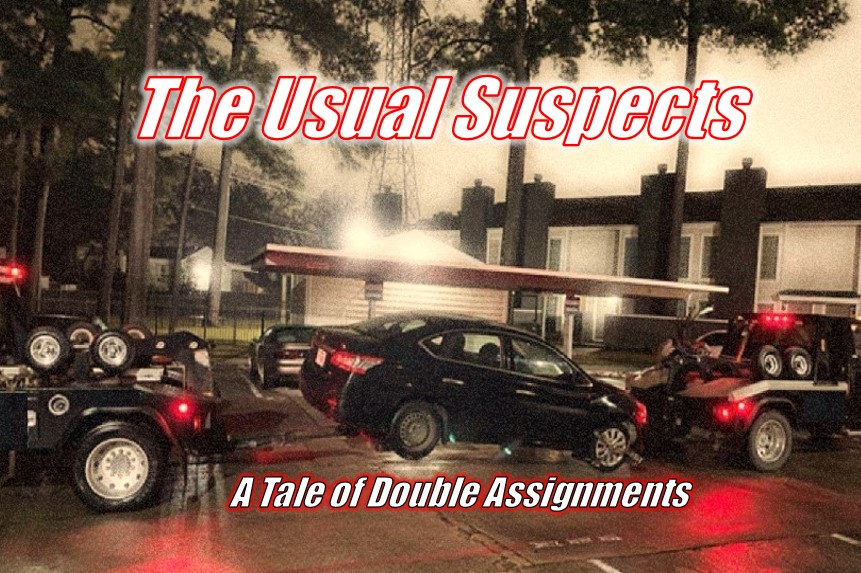GUEST EDITORIAL
As a Professional Recovery Agent. Our main goal is to recover a vehicle safely and as quickly as possible. To avoid confrontation and possibly much, much worse. How can we do this properly when some clients are setting us up for failure and possible fatal injury? I’ll explain.
If I get a Direct assignment to recover a vehicle then I should be the *only* recovery agent working this account. The only one on the Drive way at 3am. That’s it, No if ands or buts about it.
If I don’t recover the vehicle in a yet to be determined industry standard/minimum time frame then be my guest and close it with me and release it into the LPR Camera cloud but not one second before it closes. This is a serious business not a multiplayer game. Is your hired agent’s life not worth a few extra days before its launched in to camera cloud?
At no point should two different recovery companies be on the same driveway in the middle of the night or any other time. It’s very dangerous, even more so when the debtor walks out his front door and is witnessing not one but TWO tow trucks from different companies. Especially in our current gun violence climate of “shoot first and ask questions later.”
The Ultimate example of this dangerous tactic would be the Direct work of Truist/Regional Acceptance / BB&T. They have practiced this model since the first days of LPR cameras. Well over a decade ago.
When someone dies the lawsuit will go directly after the person that made it POSSIBLE for multiple agents to be there at the same time. Lawyers will argue that this all could have been easily avoided and they would be correct.
Do any of the Truist Board members know that this could be something that tarnishes their name via their position? Do the shareholders know this could hurt their bottom line? Maybe they should. We know the clients take their PR very seriously and nothing would hurt that image more than a story of this next to that family friendly corporate logo.
Asking for the Clients of our Industry to collectively eliminate this dangerous practice. It’s in your and our best interest. Who will be first?
Stay Safe.
Anonymous Agency Owner

ARE YOU LISTENING?
I generally don’t allow anonymous editorials that call out any particular vendor, association or service provider in particular. And while this editorial calls out Truist/Regional Acceptance / BB&T, it does so for a very important reason and brings up issues that lenders do not seem to be taking seriously and that is the ancient and unsafe practice of double assignments.
This is dangerous and I believe that it is important for agency owners to call out lenders who engage in this practice. I encourage it so that agents in the field are always aware of this potential. Furthermore, it is something agency owners should be aware of before wasting extra valuable time and fuel spinning their wheel over an assignment that could turn dangerous or even deadly.
Let’s start with a basic fact. Assigning an account through LPR is an assignment, and no different than assigning it directly to an agent. Having both open in the same vicinity causes issues to not only the agent, but the consumer, your customer.
Having two agents brawl in the driveway at 3am over an account assigned through two different channels is both a dangerous and unnecessary waste of time and energy for both companies and a poor reflection of the lender. After all, to the consumer, every agent in the field attempting to recover their vehicle is a reflection of that lender.
While these incidents don’t make the newspapers or the internet except in social media chat rooms, they happen almost daily. Agents fight, guns have been drawn and agents have actually made moronic efforts to steal the repossession from another agent in a wheel lift tug-of-war. How long until it gets someone killed again?
Yes, I said again.
A Deadly Double Assignment
Yes, I am bringing up Tommy Deen Morris again. I feel it is important that every lender, forwarder and agent know this tale and think about it whenever they risk double assignment. Perhaps it can save an agent their life or limb and perhaps it can spare a lender a massive lawsuit.
At 3:30 A.M. on Feb. 25, 1994, Tommy Deen Morris was backing his tow truck to a Ford pick-up in an unincorporated section of Harris County, Texas. What he was not aware of was that another agent assigned the same account had just left after having been threatened at gunpoint by the borrower, Jerry Casey Jr.

When Tommy arrived at Casey’s house, Casey was waiting. Without warning, Casey opened fire from behind the tow truck with a .30-30 telescopic rifle. Tommy was shot through the neck and both lungs and died on the spot.
Police declined to arrest Mr. Casey, citing a frontier-era law, Texas Penal Code 9.41, an 1800’s frontier era law created to deal with cattle thieves, that gives Texans considerable leeway at night to kill thieves and intruders. Despite public outcry from not just the repossession industry, but from across the nation, 8 months later, Casey was cleared of any wrongdoing.
Casey committed suicide soon after being cleared of charges.
Harris County District Attorney, Johnny B. Holmes Jr., said the matter would simply boil down to whether a grand jury believed that Mr. Casey believed the repo man was an auto thief.
Holmes defended the Texas law and seemed disinterested in prosecuting Mr. Casey and instead chose to question why T.D. didn’t call or give some warning that he was coming.
Just a few month’s after Casey was cleared by the DA of any wrong doing, Casey committed suicide.
After the law failed to provide justice, Donna Morris, T.D.’s wife carried on the fight for three more long years with a lawsuit against the lien holder of the assignment, Donna Morris v. Charlie Thomas Used Cars (Steeplechase Motor Company) in a Wrongful Death suit and was awarded a $3.5 Million Verdict. During the discovery period of this case, it was discovered that Steeplechase Motors had already assigned this repossession with another agent who had just unsuccessfully been to the residence just one hour earlier.
To this day, Donna Morris and their now fully grown four children, mourn their belated husband and father and no amount of money can bring him back. The best we can hope for, is that someone in the collections and repossession assignment process takes heed of this cautionary tale and follow this one simple rule; “One Repossessor per Assignment at a Time.” That’s not complicated at all, and it may save someone’s life.
A Root Problem
Of course, much of the blame for double assignments lies in the contingency assignments business model. Up until about twenty years ago, everyone knew that taking contingency work was for suckers and anyone who did take it was deemed something of an industry bottom feeder of an agency. Agency owners used to be able to charge their worth and closing fees were a part of it that no respectable lender batted an eye at.
Since then and with the proliferation of forwarding companies, contingency has been leveraged as a marketing tool to sell their services to the lenders reducing lender expenses on unrecovered assignments. What was once an exception has since become the rule, and one few people even bother to complain about anymore.
When a lender doesn’t have to pay for wasted efforts, they tend to continue to waste efforts. Why not, there’s nothing to lose. Even if you assign an account to ten different agencies, you only have to pay one repossession fee. The thought process is that the more people running the assignment at once, the quicker it will be recovered and the higher the recovery ratio.
This practice illustrates an absence of decency, respect, and transparency that one would expect from a client in a professional relationship of such risk of injury or worse. It is abusive.
Vendor Abuse
Let’s be honest. The practice of double assignments shows a lack of respect for the agents risking their lives every day. It is an abusive practice on their vendors to waste company’s resources just because you can. It is vendor abuse.
I remember one agency owner telling me about a client of theirs who had a new manager take over their repo department. She had decided that all forwarders should compete against each other to prove themselves. She went from using 3 forwarders to using 10 forwarders in 2 weeks!
She then started assigning the same account to three different forwarders and justified it to her team by telling them that she sent a different address to each forwarder to assign out and “if the agents or forwarders skip it and find addresses that cause them to trip over each other, that is their own fault.”
This is not a responsible or professional practice to say the least. This is a dangerous manager with no respect for their vendors, customers or company image. This is a person who could get someone seriously injured or worse.
Whether a lender is using three forwarding companies or ten doesn’t matter so long as they follow one rule; “One Repossessor per Assignment at a Time.”
It’s not rocket science. It’s the right thing to do. It’s the safest thing to do. It is what a lender who respects and values their relationship with the repossession industry does.
Kevin Armstrong
Publisher
Related Articles;
Fallen Agents Day – February 25th
Double Assignments = Deadly Assignments











More Stories
Rising Fuel Costs Are Impacting Repossession Operations
Colorado Bill Aims to Severely Impact All Repossession Operations
Today is Fallen Agents Day – 2026
From Auction Cutting to Field Programming: The Structural Shift No One Budgeted For
Bad Apples in the Repossession Industry
Why Self-Help Repossession Is Taken for Granted — and Why Losing It Would Hurt Consumers Most